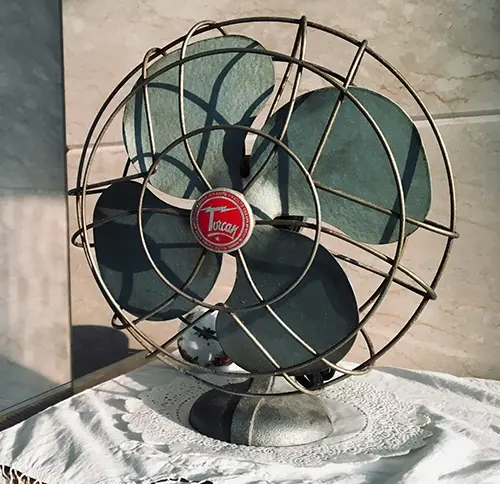
Air Conditioners vs Fans
Energy Consumption:

Central Air Conditioning (AC): Typically consumes around 3,500 watts per hour.
AC Window Unit: Uses between 600 and 1,500 watts per hour, depending on size and efficiency.
Ceiling Fan: Consumes approximately 30 to 50 watts per hour.
Smaller Box Fans (≤10 inches): Use about 25 to 30 watts per hour at maximum speed.
Larger Box Fans (20 inches): Average consumption is between 50 and 100 watts per hour, though some models may use up to 200 watts.
Mechanism Differences:
Fans: Create airflow that enhances the evaporation of moisture from the skin, producing a cooling sensation without lowering the ambient temperature.
Air Conditioners: Extract heat from indoor air and expel it outside, effectively reducing the indoor temperature and humidity.
Cooling Efficiency:
Fans: While energy-efficient, fans do not decrease room temperature or humidity. In high temperatures, especially above 90°F (32.2°C), reliance on fans alone may not prevent heat-related illnesses. The CDC advises that "electric fans may provide comfort, but when the temperature is in the high 90s, they will not prevent heat-related illness."
Air Conditioners: Consume more energy but are effective in cooling indoor spaces and reducing humidity, which is crucial during extreme heat. Maintaining a cool environment is essential to prevent heat-related health issues.
Additional Considerations:
Indoor Temperatures: Can vary from outdoor readings due to factors like building design, insulation, sun exposure, and ventilation.
Health Precautions: Heat-related illnesses, such as heat stroke, are serious and can be life-threatening. Prioritize safety by staying cool, hydrating adequately, and choosing appropriate cooling methods during heatwaves. The CDC emphasizes that "heat stroke is the most serious heat illness. It happens when the body can't control its own temperature and its temperature rises rapidly."
In summary, while fans are energy-efficient and useful for air circulation, they may not suffice during extreme heat. Air conditioners, despite higher energy usage, provide necessary cooling to maintain safe indoor temperatures during high heat conditions.
Sources:
hhttps://www.cdc.gov/climateandhealth/pubs/extreme-heat-guidebook.pdf
https://www.batteryequivalents.com/box-fan-wattage-how...
https://reviewed.usatoday.com/.../air-conditioners-vs...

